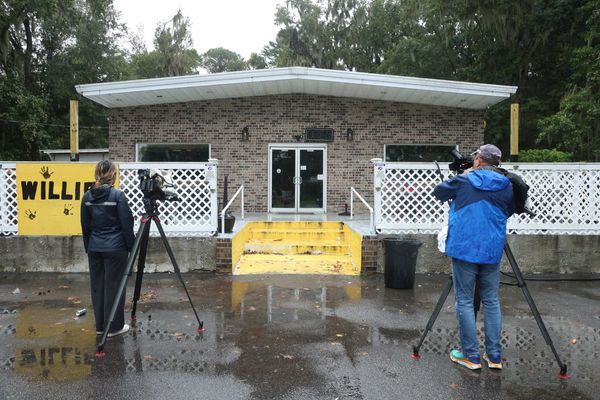Actor George Clooney played Batman in the 1997 "Batman & Robin" film. But for his planned Broadway debut in 2025, he'll star as journalism superhero Edward R. Murrow.
It's easy to see why. Murrow's long-standing commitment to groundbreaking reporting is still legendary. He rose to prominence for his World War II coverage. But Murrow is also considered a genius at spotting young talent in assembling the "Murrow Boys" team of daring war correspondents.
It's no wonder Clooney's admiration for Murrow spans decades. In 2005, Clooney directed "Good Night, and Good Luck," a film about Murrow. That movie focused on just one chapter of Murrow's eventful life — the early 1950s when he exposed Sen. Joseph McCarthy's efforts to label his foes as communist sympathizers.
But the Broadway show will take another look at Murrow's unshakable principles: courage, integrity and journalistic excellence. David Cromer, who will direct Clooney on Broadway, said in a statement that Murrow "operated from a kind of moral clarity" that's rare in today's media.
Take Strength From Struggles Like Edward R. Murrow
Murrow didn't start from a privileged place. Until age six, Murrow (1908-1965) lived with his parents and siblings in a log cabin in North Carolina. The family struggled to get by.
Their prospects improved only slightly when they moved to Washington state in 1914. But despite early obstacles, Murrow took his education seriously.
"It was a pretty tough upbringing," said Bruce Pinkleton, dean of the Edward R. Murrow College of Communications at Washington State University. "But he developed a strong work ethic from working in a rough-and-tumble logging camp," he said. The logging camp was Murrow's job for three summers while an undergraduate at what was then known as Washington State College.
Stand Out From The Rest Like Murrow
By the time Murrow graduated in 1930, he stood out. He was already a "super-achiever" in high school, according to A.M. Sperber, author of "Murrow: His Life and Times." Murrow excelled in debate and served as valedictorian.
In college, he bonded with his speech instructor, Ida Lou Anderson, who suffered from a childhood case of polio. She was also a broadcasting coach who advised the college radio station.
A speech major, Murrow starred as a college debater, acted in campus plays and served as class president.
"He had an early tendency toward leadership roles," Pinkleton said.
Take Chances Like Murrow
Murrow landed a job with CBS at age 27. And he moved to London two years later to lead its European bureau. His timing was fortuitous.
As war clouds loomed, Murrow plunged into the fray as a radio broadcaster. His eyewitness accounts of the German annexation of Austria in 1938 and the Battle of Britain in 1940 captivated his listeners.
His fame soared along with his courage as a reporter. During German air attacks known as the Blitz, Murrow's live broadcasts from London rooftops in 1940 made the war more palpable to millions of Americans.
"He had to be hospitalized a few times due to exhaustion," said Les Rose, a longtime journalist and professor at Syracuse University's Newhouse School of Public Communications. Meanwhile, "He was risking his life, and CBS didn't want him to die on a rooftop" as bombs fell around him.
Beyond his bravery under fire, Murrow's success as a broadcaster flowed from his hard work and years of practice in polishing his writing and speaking skills. He took input from Anderson — who stayed in touch with her prize student. But he also worked with Robert Trout, a CBS radio reporter, to enhance his own on-air delivery.
As a result, Murrow was well prepared to capitalize on his early career opportunities, Rose says.
Spot Budding Talent Like Murrow
During his 25-year career at CBS, Murrow also recruited a team of journalists to deepen the network's coverage. They were the Murrow Boys.
He sought out bright, hardworking young men and women who shared his commitment to report news accurately and tell stories that mattered. He had an uncanny ability to spot talent.
"They were hand-picked, but sometimes Murrow had to move fast when hiring them," Rose said.
Murrow pounced when he met a promising go-getter. Sometimes he conducted job interviews without letting on his intentions.
Pick Your Colleagues
In 1957, Marvin Kalb was working on a Ph.D. in Russian history at Harvard University when he received a fateful phone call. Murrow, who read an article that Kalb has just written for The New York Times Magazine, asked the young academic to meet him the next day to discuss Russia.
Stunned, Kalb gladly rushed to New York to see Murrow. They spent three hours discussing Russia.
"His sleeves were rolled up, his tie was undone and he kept asking me lots of questions about Russia and gave me the opportunity to answer at length," Kalb, 93, recalled. "He was an intensely curious person."
As the meeting ended, Murrow got up, put his arm around Kalb's shoulder and said, "How would you like to join CBS?"
Despite his lack of radio or TV news experience, Kalb instantly abandoned his academic career to sign on.
"(Getting a job offer) was the furthest thing on my mind," said Kalb, who didn't suspect that the conversation doubled as a job interview. He was simply thrilled to chat with Murrow, the famous reporter.
As it turns out, Kalb was the last reporter Murrow hired at CBS.
Hire Smart People And Let Them Shine
As a boss, Murrow did not micromanage his team. Instead, he gave them autonomy to do their job and earn success.
Richard C. Hottelet, one of the Murrow Boys, once told Kalb that when Murrow hired him in January 1944, he didn't tell the young newsman what he should do.
"It was up to you to perform up to Murrow's standard," Kalb said. "He wouldn't say a bad word about anybody. You would just be on the air less often. It would happen slowly."
With television's emergence in the mid-1950s, Murrow reworked "Hear It Now" — his radio broadcast — as "See It Now." A few years later, Murrow's criticism of McCarthyism helped turn public opinion against the Wisconsin Senator and his red-baiting.
Find Your Next Challenge Like Murrow
In January 1961, Murrow left CBS to join the Kennedy administration as head of the United States Information Agency. The USIA sought to present the American government's actions in a positive light to a global audience.
"It was propaganda — Murrow used that word — but it was to tell the truth about the JFK administration and America," said Nancy Snow, author of "Truth is the Best Propaganda." "He really believed in American values and traditions."
At USIA, Murrow wanted to solidify America's reputation abroad by portraying it honestly. He knew that sugarcoating its failings would backfire among skeptical foreigners.
In August 1963, a USIA documentary aired called, "The March in Washington." But controversy swirled beforehand.
"Murrow had to retire from USIA (due to illness)," said Gregory Tomlin, author of "Murrow's Cold War." "The new USIA director knew that some Congressmen didn't want 'The March' to air" because it showed that racism existed in the U.S.
"But Murrow replied, 'You have to show it,' " Tomlin said. "He said the whole world is watching and it builds America's credibility" to shine a light on its imperfect union.
Tell The Truth Even If It's Not Flattering
For Murrow, propaganda worked best when it carried a frank message. Trying to fool people with exaggerated claims or downright falsity wouldn't work.
"To be persuasive, we must be believable," he said. And he added, "to be believable, we must be credible. To be credible, we must be truthful."
A heavy smoker, Murrow died at age 57 from lung cancer in 1965. But his legacy will come alive again if Clooney has anything to say about it.
Edward R. Murrow's Keys:
- Trailblazing journalist who led eyewitness radio broadcasts from London rooftops during World War II.
- Overcame: A hardscrabble upbringing in a log cabin with no electricity or plumbing.
- "To be persuasive, we must be believable. To be believable, we must be credible. To be credible, we must be truthful."







